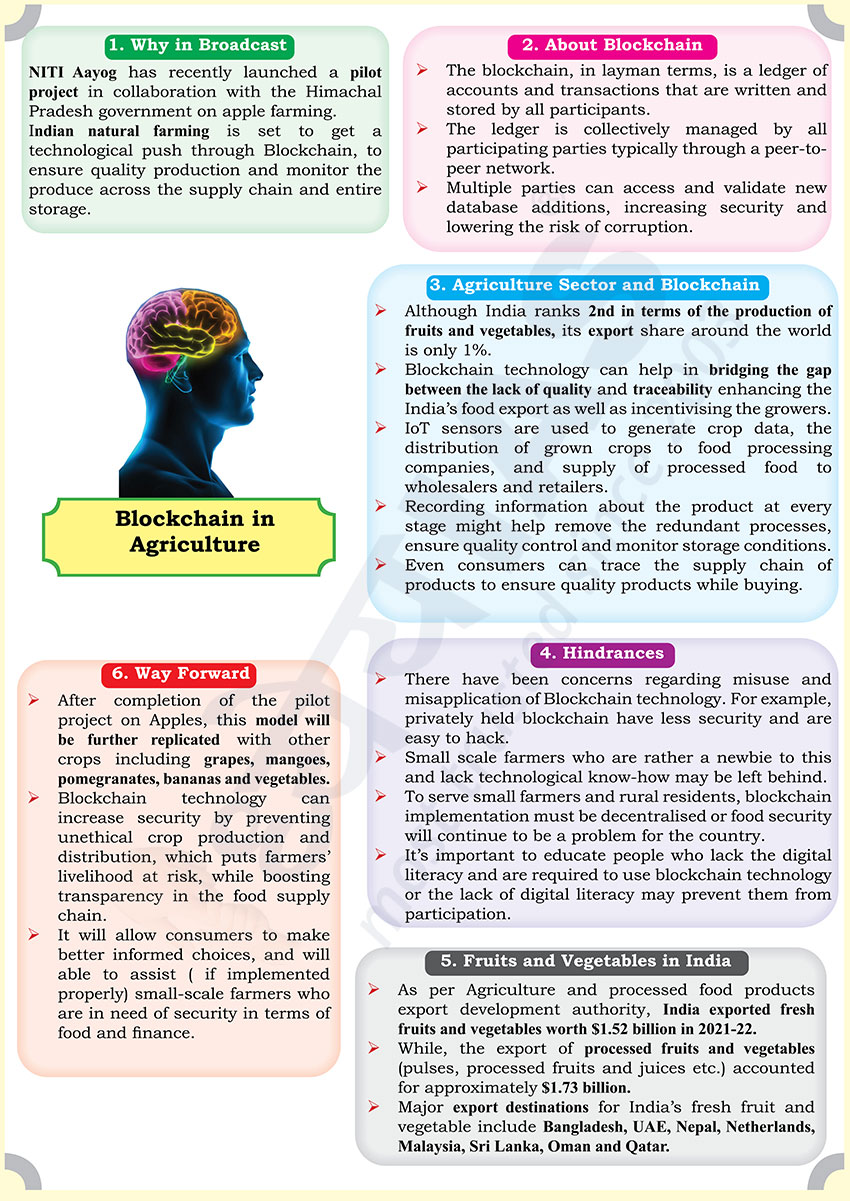Brain-booster
/
19 Jan 2023
Brain Booster for UPSC & State PCS Examination (Topic: Blockchain in Agriculture)

Why in Broadcast?
- NITI Aayog has recently launched a pilot project in collaboration with
the Himachal Pradesh government on apple farming. Indian natural farming is
set to get a technological push through Blockchain, to ensure quality
production and monitor the produce across the supply chain and entire
storage.
About Blockchain
- The blockchain, in layman terms, is a ledger of accounts and
transactions that are written and stored by all participants.
- The ledger is collectively managed by all participating parties
typically through a peer-topeer network.
- Multiple parties can access and validate new database additions,
increasing security and lowering the risk of corruption.
Agriculture Sector and Blockchain
- Although India ranks 2nd in terms of the production of fruits and
vegetables, its export share around the world is only 1%.
- Blockchain technology can help in bridging the gap between the lack of
quality and traceability enhancing the India’s food export as well as
incentivising the growers.
- IoT sensors are used to generate crop data, the distribution of grown
crops to food processing companies, and supply of processed food to
wholesalers and retailers.
- Recording information about the product at every stage might help remove
the redundant processes, ensure quality control and monitor storage
conditions.
- Even consumers can trace the supply chain of products to ensure quality
products while buying.
Hindrances
- There have been concerns regarding misuse and misapplication of
Blockchain technology. For example, privately held blockchain have less
security and are easy to hack.
- Small scale farmers who are rather a newbie to this and lack
technological know-how may be left behind.
- To serve small farmers and rural residents, blockchain implementation
must be decentralised or food security will continue to be a problem for the
country.
- It’s important to educate people who lack the digital literacy and are
required to use blockchain technology or the lack of digital literacy may
prevent them from participation.
Fruits and Vegetables in India
- As per Agriculture and processed food products export development
authority, India exported fresh fruits and vegetables worth $1.52 billion in
2021-22.
- While, the export of processed fruits and vegetables (pulses, processed
fruits and juices etc.) accounted for approximately $1.73 billion.
- Major export destinations for India’s fresh fruit and vegetable include
Bangladesh, UAE, Nepal, Netherlands, Malaysia, Sri Lanka, Oman and Qatar.
Way Forward
- After completion of the pilot project on Apples, this model will be
further replicated with other crops including grapes, mangoes, pomegranates,
bananas and vegetables.
- Blockchain technology can increase security by preventing unethical crop
production and distribution, which puts farmers’ livelihood at risk, while
boosting transparency in the food supply chain.
- It will allow consumers to make better informed choices, and will able
to assist ( if implemented properly) small-scale farmers who are in need of
security in terms of food and finance.







